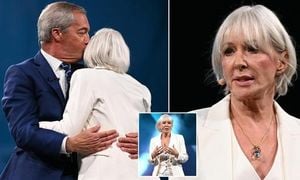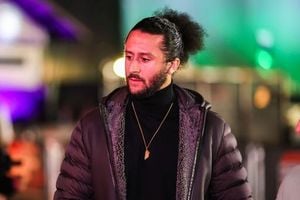In the days since the shocking assassination of conservative activist Charlie Kirk, his widow Erika Kirk has become both a symbol of personal grief and a new leader for the movement her husband built. Erika, 36, now chairs Turning Point USA, the organization Charlie founded in 2012, and she has spoken candidly about her heartbreak, her faith, and her determination to honor her husband’s legacy—even as she struggles to process his violent death.
Charlie Kirk was fatally shot on September 10, 2025, during a Turning Point USA event at Utah Valley University. The attack, which took place as Kirk addressed a crowd on campus, stunned supporters and critics alike. According to The New York Times, Kirk had long been aware of the risks inherent in his high-profile activism, having received numerous death threats over the past year. He had been traveling with a security team for months, a precaution Erika urged him to take seriously.
“Just hours before he left for Utah, I begged him to wear a bulletproof vest,” Erika recalled to The U.S. Sun. “A friend at dinner even suggested he speak behind bulletproof glass. Charlie just shook his head and said, ‘Not yet.’ He was confident in his team and the campus security.”
The night before the shooting, Erika and Charlie met with a faith leader friend in Phoenix to pray ahead of his tour of nearly two dozen college campuses. Erika admitted that she and her friend were both anxious about Charlie’s safety, given the divisive crowds his appearances often attracted. “Charlie had implied to numerous people that he could be killed by violence as part of his job,” she said. “I now wonder if he had accepted that fate.”
On the day of the shooting, tragedy struck quickly. As Kirk spoke at the Utah Valley University event, a shot rang out from a rooftop some 200 yards away, striking him in the neck. Medics rushed to his aid, tearing the small St. Michael pendant from around his neck as they tried desperately to stop the bleeding. The pendant, now stained with his blood, became a sacred keepsake for Erika. “I wear it every day,” she told The New York Times. “There’s still blood in the crevice of the cross.”
Erika’s grief has been raw and public. She confessed to reporters that she still cannot bring herself to wash the towels Charlie used for his last shower, and that she rotates where she sleeps, unable to enter their bedroom. “To this day, I can’t go into my bedroom,” she said. “I’m rotating where I sleep.”
After the shooting, Erika was advised by the sheriff not to view her husband’s body due to the extent of the wounds. She refused. “With all due respect, I want to see what they did to my husband,” she insisted. At the hospital, she kissed Charlie goodbye and later described his face as peaceful, with “semi-open eyes and a Mona Lisa-like half-smile. Like he’d died happy. Like Jesus rescued him. The bullet came, he blinked, and he was in heaven.”
Charlie’s suspected killer, 22-year-old Tyler Robinson, was quickly taken into custody after his own father turned him in to authorities. The FBI charged Robinson with aggravated murder and other felonies. Prosecutors have demanded the death penalty if he is found guilty. But Erika, in a striking act of forgiveness, has chosen not to advocate for the harshest punishment. “I do not want that man’s blood on my ledger,” she explained. “Because when I get to heaven, and Jesus is like: ‘Uh, eye for an eye? Is that how we do it?’ And that keeps me from being in heaven, from being with Charlie?”
As she prepared to speak at Charlie’s memorial service at State Farm Stadium in Glendale, Arizona—a service attended by thousands and livestreamed by The U.S. Sun—Erika reflected on their life together and the sudden void left behind. She met Charlie at a Turning Point event in 2018, and together they had two young children. She described herself as “allowing myself to feel this so deeply,” finding comfort in her faith and the support of friends and family.
Turning Point USA, the organization Charlie built from scratch at age 18, has been thrust into the spotlight by his death. The group’s memorial event, titled “Building a Legacy, Remembering Charlie Kirk,” was marked by a patriotic dress code, heightened security, and what many described as one of the largest gatherings for a political figure in recent memory. The organization issued strict instructions for mourners, including a no-bag policy and increased security, reflecting continued concerns for the safety of conservative activists.
President Donald Trump, a close ally of Charlie Kirk, has called Erika twice since the assassination, offering his support and condolences. “Charlie was like a son to him,” Erika said. “When the president said, ‘Just let us know how we can support you,’ I told him, ‘My husband just loved conversing with you and using you as a sounding board for all sorts of things. Could we continue that?’ And he said, ‘Of course.’” Erika described Trump’s tone as “soft and embracing. I could tell he wanted to hug me.”
Charlie Kirk’s rise to prominence was meteoric. He transformed conservative youth activism from a marginal movement into a powerful force, building Turning Point USA into a major political and media empire. His confrontational style, mastery of social media, and unapologetic support for Trump made him a hero to many and a lightning rod for criticism. He was known for framing political issues as a “spiritual battle” and for championing a brand of populist conservatism that resonated with young people who felt alienated from traditional Republican circles.
In the wake of his assassination, Erika Kirk has stepped into the leadership of Turning Point USA, determined to continue her husband’s work even as she mourns his absence. “I’m a strong believer that this was God’s plan,” she said. “And it’s so clear-cut. It couldn’t be more Charlie.”
For Erika, the blood-stained pendant is more than a relic of tragedy—it is a daily reminder of love, sacrifice, and the enduring power of faith in the face of unspeakable loss.





